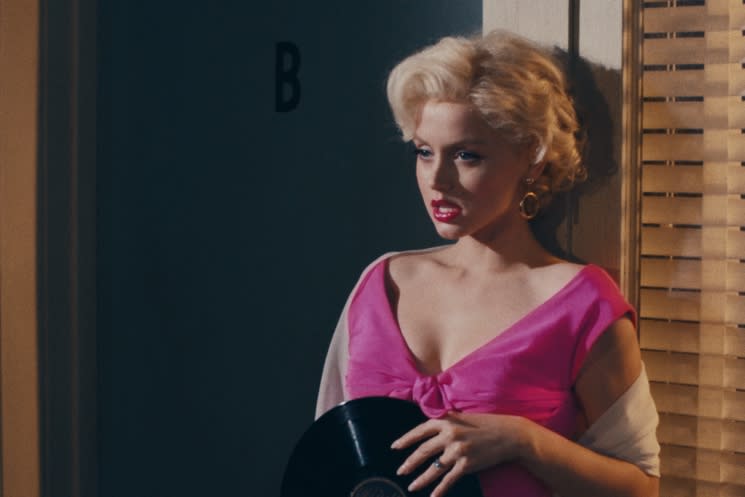Blonde opens with a young Norma Jeane (Marilyn Monroe's real name) and her mother, Gladys (Julianne Nicholson), a mentally ill alcoholic who tells grand stories of Norma's father, who apparently lives in Hollywood Hills and works in showbiz. Gladys is shown abusing young Norma and attempting to drown her in the bathtub. When Norma is finally taken away, all she is left with are the emotional scars of an abusive parent, PTSD, and an obsession with finding her father.
The film then abruptly cuts straight to Marilyn (Ana de Armas), the starlet who gets screen time but is now abused by the powerful men in Hollywood. We see her moving from her first marriage to New York Yankees legend Joe DiMaggio (Bobby Cannavale), who turns out to be violent, to her next husband, playwright Arthur Miller (Adrien Brody) – both of whom she refers to as "daddy."
Based on the novel by Joyce Carol Oates and written and directed by Andrew Dominik, Blonde is sometimes a beautiful collage of Marilyn's life, especially with camera movements that glide between colour and black-and-white to reflect her tumultuous state of mind. However, the film eventually reduces the starlet to nothing more than a victim who was used and abused by Hollywood — ignoring how the real Marilyn was ambitious, talented, successful and smart. But Blonde victimizes her to the max, showing Norma Jeane as merely a prisoner of her pinup persona.
Ana de Armas beautifully embodies the duality of the role: Marilyn Monroe, the star who is plastered on billboards across Los Angeles, and Norma Jeane, the shell of a woman who barely recognizes herself in the mirror. It's in these moments as the latter where de Armas captures her naked vulnerability.
The actress succeeds in capturing the essence of Marilyn, and many times even looks uncannily like her. But this was a lost opportunity for the actress, who could have very much been given a deeper portrayal of everything Marilyn was besides pill-popping prey with daddy issues.
There are some scenes that are gratuitous — such as tending to JFK in his hotel room, or the many abortion trips to the hospital, or even the talking CGI fetus. Perhaps these are intended to shock the audience, but they fail to add any value to the biopic.
There's only so much one can watch someone suffer and be abused, and this overlong, three-hour film cloaked in misery burns viewers out long before her ultimate demise.
(Netflix)The film then abruptly cuts straight to Marilyn (Ana de Armas), the starlet who gets screen time but is now abused by the powerful men in Hollywood. We see her moving from her first marriage to New York Yankees legend Joe DiMaggio (Bobby Cannavale), who turns out to be violent, to her next husband, playwright Arthur Miller (Adrien Brody) – both of whom she refers to as "daddy."
Based on the novel by Joyce Carol Oates and written and directed by Andrew Dominik, Blonde is sometimes a beautiful collage of Marilyn's life, especially with camera movements that glide between colour and black-and-white to reflect her tumultuous state of mind. However, the film eventually reduces the starlet to nothing more than a victim who was used and abused by Hollywood — ignoring how the real Marilyn was ambitious, talented, successful and smart. But Blonde victimizes her to the max, showing Norma Jeane as merely a prisoner of her pinup persona.
Ana de Armas beautifully embodies the duality of the role: Marilyn Monroe, the star who is plastered on billboards across Los Angeles, and Norma Jeane, the shell of a woman who barely recognizes herself in the mirror. It's in these moments as the latter where de Armas captures her naked vulnerability.
The actress succeeds in capturing the essence of Marilyn, and many times even looks uncannily like her. But this was a lost opportunity for the actress, who could have very much been given a deeper portrayal of everything Marilyn was besides pill-popping prey with daddy issues.
There are some scenes that are gratuitous — such as tending to JFK in his hotel room, or the many abortion trips to the hospital, or even the talking CGI fetus. Perhaps these are intended to shock the audience, but they fail to add any value to the biopic.
There's only so much one can watch someone suffer and be abused, and this overlong, three-hour film cloaked in misery burns viewers out long before her ultimate demise.
